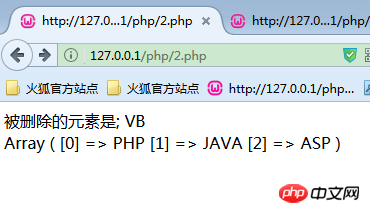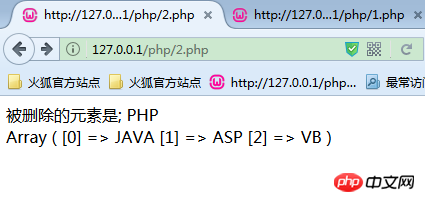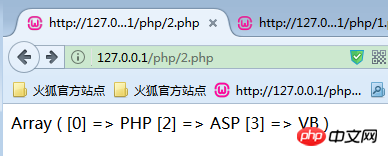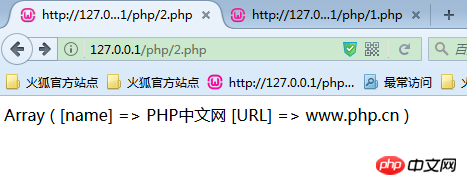How to delete the head, tail, and any element in a PHP array
In a previous article, we introduced "How to add elements to the head and tail of a PHP array" Since there are elements to add, there are elements to delete. Today's article details how to delete them. The head and tail elements of an array, as well as any array elements.
Delete the last element: array_pop
Just like the bullet clip, the last bullet pressed in is the first to pop out. In the computer In terminology, we call it first-in-last-pop
Since array_push adds an element to the end of the array, array_pop deletes an element from the end of the array.
The array_pop() function gets and returns the last element of the array, and reduces the length of the entire array by 1. If the array is empty (or not an array), then null is returned.
The syntax format is as follows:
mixed array_pop ( array &$array )
The parameter array is the input array.
The following is an example of the array_pop() function deleting the last element of the group number. The specific code is as follows:
<?php
header("Content-Type:text/html; charset=utf-8");
$atr = array("PHP","JAVA","ASP","VB"); //定义数组
$array = array_pop($atr); //删除数组中最后一个元素
echo "被删除的元素是; $array<br>"; //输出被删除的元素
print_r($atr); //打印数组结构
?>The output result is:

Delete the header element: array_shift
In addition to first-in-last-out, there is also a first-in-first-out stack in the computer, which can be regarded as a pipe, first in The elements come out first
Since array_pop can pop elements from the end of the array, there should be a function that can pop elements from the head of the array. We use array_shift
mixed array_shift ( array &$array )
Below we will use array_shift( ) function to realize the instance of deleting the head element in the array. The specific code is as follows:
<?php
header("Content-Type:text/html; charset=utf-8");
$atr = array("PHP","JAVA","ASP","VB"); //定义数组
$array = array_shift($atr); //删除数组中第一个元素
echo "被删除的元素是; $array<br>"; //输出被删除的元素
print_r($atr); //打印数组结构
?>The output result is:

In fact The syntax for deleting head elements and deleting tail elements in a group is the same, but the functions used are different!
##Delete any element in the array
Above we introduced how to delete the head and tail elements of the array. Deleting any element in the array is simpler than the previous two. To delete any element, you can just use unset! Below we will use the unset function to delete element instances in any array. The specific code is as follows:
<?php
header("Content-Type:text/html; charset=utf-8");
$atr = array("PHP","JAVA","ASP","VB"); //定义数组
unset($atr[1]); // 删除JAVA
print_r($atr); //打印数组结构
?>
Explanation: What is deleted above is the index array. The index array can be deleted according to the specified subscript. If the element is deleted from the associated array, the specified element can be deleted according to the key!
The following example is how todelete elements in an associative array, the specific code is as follows;
<?php
header("Content-Type:text/html; charset=utf-8");
$atr = array("name"=>"PHP中文网","URL"=>"www.php.cn","QQ"=>"88526"); //定义数组
unset($atr["QQ"]); // 删除88526
print_r($atr); //打印数组结构
?> 
Instructions
unset can delete any variable or array
The reference code is as follows:<?php
header("Content-Type:text/html; charset=utf-8");
$atr = array("name"=>"PHP中文网","URL"=>"www.php.cn","QQ"=>"88526"); //定义数组
unset($atr); // 删除数组
var_dump($atr); //打印数组结构
?>
How to delete duplicate elements in PHP arrays"!
Use arrays to implement stack operations: array_push and array_pop》
The above is the detailed content of How to delete the head, tail, and any element in a PHP array. For more information, please follow other related articles on the PHP Chinese website!

Hot AI Tools

Undresser.AI Undress
AI-powered app for creating realistic nude photos

AI Clothes Remover
Online AI tool for removing clothes from photos.

Undress AI Tool
Undress images for free

Clothoff.io
AI clothes remover

Video Face Swap
Swap faces in any video effortlessly with our completely free AI face swap tool!

Hot Article

Hot Tools

Notepad++7.3.1
Easy-to-use and free code editor

SublimeText3 Chinese version
Chinese version, very easy to use

Zend Studio 13.0.1
Powerful PHP integrated development environment

Dreamweaver CS6
Visual web development tools

SublimeText3 Mac version
God-level code editing software (SublimeText3)

Hot Topics
 PHP 8.4 Installation and Upgrade guide for Ubuntu and Debian
Dec 24, 2024 pm 04:42 PM
PHP 8.4 Installation and Upgrade guide for Ubuntu and Debian
Dec 24, 2024 pm 04:42 PM
PHP 8.4 brings several new features, security improvements, and performance improvements with healthy amounts of feature deprecations and removals. This guide explains how to install PHP 8.4 or upgrade to PHP 8.4 on Ubuntu, Debian, or their derivati
 7 PHP Functions I Regret I Didn't Know Before
Nov 13, 2024 am 09:42 AM
7 PHP Functions I Regret I Didn't Know Before
Nov 13, 2024 am 09:42 AM
If you are an experienced PHP developer, you might have the feeling that you’ve been there and done that already.You have developed a significant number of applications, debugged millions of lines of code, and tweaked a bunch of scripts to achieve op
 How To Set Up Visual Studio Code (VS Code) for PHP Development
Dec 20, 2024 am 11:31 AM
How To Set Up Visual Studio Code (VS Code) for PHP Development
Dec 20, 2024 am 11:31 AM
Visual Studio Code, also known as VS Code, is a free source code editor — or integrated development environment (IDE) — available for all major operating systems. With a large collection of extensions for many programming languages, VS Code can be c
 Explain JSON Web Tokens (JWT) and their use case in PHP APIs.
Apr 05, 2025 am 12:04 AM
Explain JSON Web Tokens (JWT) and their use case in PHP APIs.
Apr 05, 2025 am 12:04 AM
JWT is an open standard based on JSON, used to securely transmit information between parties, mainly for identity authentication and information exchange. 1. JWT consists of three parts: Header, Payload and Signature. 2. The working principle of JWT includes three steps: generating JWT, verifying JWT and parsing Payload. 3. When using JWT for authentication in PHP, JWT can be generated and verified, and user role and permission information can be included in advanced usage. 4. Common errors include signature verification failure, token expiration, and payload oversized. Debugging skills include using debugging tools and logging. 5. Performance optimization and best practices include using appropriate signature algorithms, setting validity periods reasonably,
 PHP Program to Count Vowels in a String
Feb 07, 2025 pm 12:12 PM
PHP Program to Count Vowels in a String
Feb 07, 2025 pm 12:12 PM
A string is a sequence of characters, including letters, numbers, and symbols. This tutorial will learn how to calculate the number of vowels in a given string in PHP using different methods. The vowels in English are a, e, i, o, u, and they can be uppercase or lowercase. What is a vowel? Vowels are alphabetic characters that represent a specific pronunciation. There are five vowels in English, including uppercase and lowercase: a, e, i, o, u Example 1 Input: String = "Tutorialspoint" Output: 6 explain The vowels in the string "Tutorialspoint" are u, o, i, a, o, i. There are 6 yuan in total
 How do you parse and process HTML/XML in PHP?
Feb 07, 2025 am 11:57 AM
How do you parse and process HTML/XML in PHP?
Feb 07, 2025 am 11:57 AM
This tutorial demonstrates how to efficiently process XML documents using PHP. XML (eXtensible Markup Language) is a versatile text-based markup language designed for both human readability and machine parsing. It's commonly used for data storage an
 Explain late static binding in PHP (static::).
Apr 03, 2025 am 12:04 AM
Explain late static binding in PHP (static::).
Apr 03, 2025 am 12:04 AM
Static binding (static::) implements late static binding (LSB) in PHP, allowing calling classes to be referenced in static contexts rather than defining classes. 1) The parsing process is performed at runtime, 2) Look up the call class in the inheritance relationship, 3) It may bring performance overhead.
 What are PHP magic methods (__construct, __destruct, __call, __get, __set, etc.) and provide use cases?
Apr 03, 2025 am 12:03 AM
What are PHP magic methods (__construct, __destruct, __call, __get, __set, etc.) and provide use cases?
Apr 03, 2025 am 12:03 AM
What are the magic methods of PHP? PHP's magic methods include: 1.\_\_construct, used to initialize objects; 2.\_\_destruct, used to clean up resources; 3.\_\_call, handle non-existent method calls; 4.\_\_get, implement dynamic attribute access; 5.\_\_set, implement dynamic attribute settings. These methods are automatically called in certain situations, improving code flexibility and efficiency.






